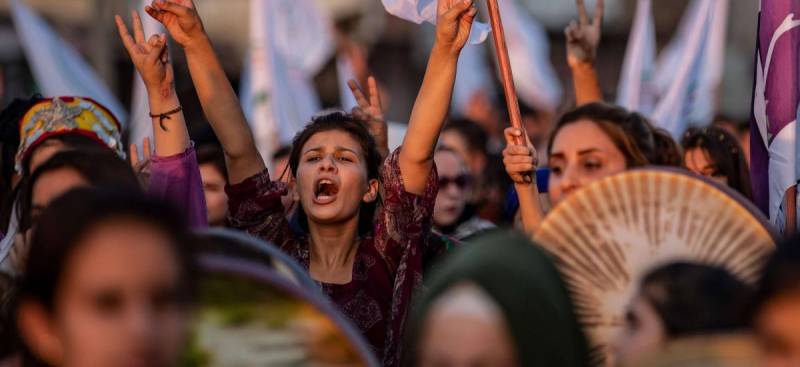My grandmother Ayşe lived a long life. Sometimes she used to talk about the past, she used to tell about the soldiers coming to their village and when the soldiers had come, how they fled to the mountains. As some soldiers were spending the whole winter in their villages, she told us how they were frightened and couldn’t come back to their homes and every winter, how children had died in the mountains because of cold weather. Some were caught by the wolves, some starved to death and some had died because of freezing cold… There was a big fear of soldiers because according to grandma Ayşe, one of the main reasons for fear of the soldiers was the hanging of sheikhs living in the whole region, after the Sheikh Said rebellion.
Some of those sheikhs were hung from a tree in the garden of my grandfather’s house, who was also a sheikh. My grandmother shed tears for those sheikhs for years: “some were recently married, their hands were still hennaed” she wailed for the dead.
“We were in turbans and chadors. When they came to the village we would run away from the soldiers, we were afraid they would cut off our heads” she used to tell me.
My grandmother was persecuted a lot in her 104-year long life, she witnessed too much cruelty. She also passed away in a time of persecution, in the days of the Kobane events. There was a ban, we couldn’t attend her funeral.
My mother took over that vigil of persecution from my grandmother. Some of her brothers, who were imams, spent years in prison for “giving bread to the members of the outlawed Kurdistan Workers’ Party (PKK) who came to the village”. “They were starving, whoever comes to my door in that situation, I would give them that bread,” my uncle said, but neither law nor conscience heard his voice.
In the late 80’s, early 90’s, us, her children took over that vigil of persecution from my mother. In late 80’s, our neighbourhood began to change with the declaration of the state of emergency (OHAL), men with Kalashnikovs and white Tauruses (cars commonly used by paramilitary forces in Turkey in those years) appeared. These “uninvited guests” were abducting and killing people in broad daylight. House raids and unsolved murders became a nightly routine in our province.
With the end of the peace process in 2015, this time my children started to live the vigil of persecution with me. Long-lasting curfews, destruction of our cities, funerals on the ground, endless house raids, detentions, investigations, sleepless nights…
Millions of Kurds, rich and poor, educated and uneducated, peasant and urban, were persecuted in this country. Some lost their children, some spent their lives in prison, others at the prison gates. Some could not be appointed because they were Kurds. Some lost their jobs, because they were Kurds. Some of their villages were burned, some had to migrate to other lands as refugees. But this cycle of persecution flowed from generation to generation, it never stopped.
I think all about these while watching the documentary “Geography is Destiny” made by 140journos with jailed Kurdish politician Selahattin Demirtaş’s wife, Başak Demirtaş.
During the interview, Başak Demirtaş said; “I never thought that my daughters would live the same as I did 38 years ago”. These words of hers branded my heart.
I think, “Geography is Destiny” is just a symbolic definition, because neither Selahattin Demirtaş and his family nor millions of Kurds accept this as their “destiny” and for a century, Kurds have been struggling to change this “destiny” imposed on them.
They established political parties dozens of times but then, their parties have been shut down. They were elected to the parliament, they were elected as mayors but then they found themselves in prison. They have been dying for decades, longing for their children, but they do not accept this destiny.
There are different forms of struggle. Some are resisting in politics, some by writing, some are resisting injustice in their daily lives, some by keeping their language alive, some by working, producing… They all struggle in different ways.
Everyone is trying to fight as much as they can and resist this “destiny”. Just like Başak Demirtaş. Every week she travels 1,700 km to visit her jailed husband. Of course above all, she travels all the way long to see her loved one but it is also a message to those who imprisoned her husband unjustly and unlawfully, it is a form, a way of resistance. Indeed, at one point in the documentary, she says: “Even if he is surrounded by wire fences, I would go to see Selahattin.”
The “destiny” imposed on us Kurds does not hold back, but the persecution does not end as well.
For a century, first, our grandmothers, then our mothers and now us and our children have been suffering this persecution but at the same time, for a century, we have been resisting. We are not accepting this as a “destiny” which is imposed on us.
Yesterday morning my son said, “Mummy, I’m waiting but this year they haven’t come yet”. “Who?” I asked and “once a year they come and break the door to get you” he replied. I stopped and thought a while, “what would be the answer to my son?”, but today, I’m thinking to tell him. To tell him that both our destinies are moulded by cruelty and our resistance to this “destiny”.
